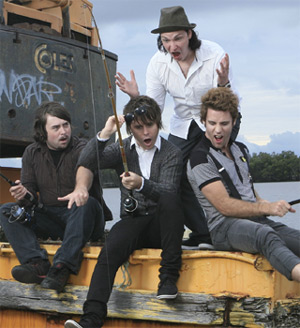The Music Network story: “For The Record: An Album Retrospective Part 4”, August 2009
In the fourth piece of a five-part puzzle, Andrew McMillen examines the digitally-inspired shift in consumer habits away from the long-established album format. This week, Andrew quits hypothesising, and instead speaks to those responsible for history’s loved and loathed albums: musicians!
In the last three weeks, we’ve indulged in much reminiscing and theorising on the value of the album format in an era of unparalleled consumer choice. “The track has been disengaged from the album!” “Artists shouldn’t automatically sprint toward the album endpoint as a result of historical programming!” “It’s easier to choose to part with around a dollar for a song you’ll love, rather than $15-20 for an unfamiliar collection!” You’re familiar with these arguments, professed from this writer’s listener/critic position. But, er – what about the artists themselves? The ones who make music? Where do they think the album belongs in 2009?
 Brisbane’s Hungry Kids Of Hungary [pictured right] write hook-heavy songs that’re informed by a studious observation of the pop legends of generations past. Their two EPs have attracted radio attention, festival slots and, most recently, a Q Song award nomination. Are they treading down the pop-proven album release path? “We sure are!” replies singer/keyboardist Kane Mazlin. “We’re currently demoing and writing songs for a debut album. Like most independent bands, it’s a matter of balancing time and finance as to when we will record and release, but we’re certainly hoping to be in a studio within three months. I think it’s just a natural progression for us to put our ideas down on a long player. It will give us more scope to present ourselves more accurately, which is something we’ve only been able to touch on when creating EPs.”
Brisbane’s Hungry Kids Of Hungary [pictured right] write hook-heavy songs that’re informed by a studious observation of the pop legends of generations past. Their two EPs have attracted radio attention, festival slots and, most recently, a Q Song award nomination. Are they treading down the pop-proven album release path? “We sure are!” replies singer/keyboardist Kane Mazlin. “We’re currently demoing and writing songs for a debut album. Like most independent bands, it’s a matter of balancing time and finance as to when we will record and release, but we’re certainly hoping to be in a studio within three months. I think it’s just a natural progression for us to put our ideas down on a long player. It will give us more scope to present ourselves more accurately, which is something we’ve only been able to touch on when creating EPs.”
No surprise, then, that the Hungry Kids are album purists. Drummer Ryan Strathie explains: “Artists put a lot into creating an album as an entire piece – a single song is only one part of the album puzzle. I think it’s crucial for an album to be experienced in full, artwork and all. For me, its just not the same without the whole package.” Strathie cautions, however: “Artists – big or small – need to take responsibility for the quality they put out. If you can’t put out 10 great songs, then don’t do an album! It’s obvious that people will still buy a record if it’s any good; too many artists maximise on a single song or a hit and put out an entire album, even if it’s not good enough.” He concludes: “People aren’t stupid, they have been burnt!”
From young upcomers to an established act: Perth’s Eleventh He Reaches London [pictured below left] have forged a respectable name for themselves at the intersection of the nation’s hard-rock, metal and hardcore communities. Their 2005 debut album The Good Fight For Harmony preceded 2009’s Hollow Be My Name, for which the five-piece received a $13,000 recording grant from the Western Australian Department Of Culture And Arts. Drummer Mark Donaldson rationalises the decision to release music in this manner: “We never really gave any thought to releasing an EP or singles, because we believe that you can get more enjoyment out of our band across an album. We wanted to release something that was quite cohesive, and had some continuity, with a good hour-long running time.”
 “I’m still a huge fan of putting on an album and listening to it all the way through. It’s very rare to experience an album that you can listen to from start to finish, and not get bored. It’s very rare to experience that, and it’s one of the things you look forward to in life, as a music fan – that next band that you’ll become completely obsessed with.” When questioned about the free MP3 downloads offered on the band’s Last.FM profile, Donaldson continues: “It’s still good for people to be able to download a song in reasonable quality, just in case they are thinking about downloading the full album. Because we’ve basically arrived at the situation where you can download a song for free, get a feel for the quality of it, and then decide whether you want to waste your bandwidth on it!”
“I’m still a huge fan of putting on an album and listening to it all the way through. It’s very rare to experience an album that you can listen to from start to finish, and not get bored. It’s very rare to experience that, and it’s one of the things you look forward to in life, as a music fan – that next band that you’ll become completely obsessed with.” When questioned about the free MP3 downloads offered on the band’s Last.FM profile, Donaldson continues: “It’s still good for people to be able to download a song in reasonable quality, just in case they are thinking about downloading the full album. Because we’ve basically arrived at the situation where you can download a song for free, get a feel for the quality of it, and then decide whether you want to waste your bandwidth on it!”
We laugh at the madness of trying to explain the rationing of 60-100 megabytes to a music fan fifteen years ago. But how does he feel about fans of the band who purport to love their music, but who’ve never bought anything from the band? “There’s no ill feelings toward those who don’t pay. What I don’t like is when people download the album, love it, but then don’t attend a show when we’re near them. That really cheeses me off, because touring is such a massive effort. You look forward to sharing the music with the audience, and that’s what playing live is all about. Being able to share your love of your songs with others.”
As co-founder of the Elefant Traks label and a renowned hip-hop artist in his own right, Sydney’s Urthboy [pictured below right] understands the record business better than most. Born Tim Levinson, his third album Spitshine is due in August 2009. He reasons: “I love the idea of the album because it allows an artist to make a little book, rather than a short chapter. I completely respect that people receive music in their preferred form, but as an artist I think the whole LP is worth holding onto. The album allows the artist to stretch out a bit, and from that perspective you’re able to tell a better story.”
 It’s a valid comment, given that hip-hop song structures are perhaps more reliant on narrative than their rock counterparts. When asked about digital distribution’s effect on the album format, Levinson concedes: “It’s slowly changing people’s attitudes and expectations toward consumption of music. We’re in a transition period where albums retain a huge significance – but some signs suggest it’s disappearing. Stranger things have happened and trends don’t always result in their predicted outcome, though.”
It’s a valid comment, given that hip-hop song structures are perhaps more reliant on narrative than their rock counterparts. When asked about digital distribution’s effect on the album format, Levinson concedes: “It’s slowly changing people’s attitudes and expectations toward consumption of music. We’re in a transition period where albums retain a huge significance – but some signs suggest it’s disappearing. Stranger things have happened and trends don’t always result in their predicted outcome, though.”
Levinson’s position at the helm of Elefant Traks informs his optimistic wisdom. When asked whether Elefant Traks have adopted alternative release strategies to album delivery, he responds: “We’ve discussed it a lot; I want to keep open-minded about it. One of our key methods of promotion is bundling as many activities into the one ad spend. Usually this is simple: the album and the tour. We’re a record label, but we’re also a default management company – we spend money to invest in the artist who hopefully invests in themselves, and in turn helps us sell their records. Touring is not lucrative across the board – that’s an industry myth – but it forms part of the overall picture. The point I’m getting at, is that not every artist can simply put out a few songs regularly, sling ’em to radio, excite the public’s imagination and wait for the money to roll in. There are significant costs associated with any release, whether EP or album. The public may like the freedom of picking and choosing but I don’t believe they’ve fallen out of love with the album yet. Singles aren’t for everybody, but our music industry is; there’s no use writing eulogies at this point in time.”
It’s worth reinforcing that the purpose of this column series is not to eulogise the album as a whole. Rather, it’s to highlight that digital distribution has allowed listeners to choose how they consume music, and musicians to choose how to deliver their creations to listeners. Next week, we’ll meet some artists who’re rejecting the album-release expectation in favour of innovation, and look to a bright future where musical expression isn’t necessarily confined to 10-12 tracks.
Brisbane-based Andrew McMillen writes for several Australian music publications. He can be found on Twitter (@NiteShok) and online at http://andrewmcmillen.com/
(Note: This is part four of an article series that first appeared in weekly Australian music industry magazine The Music Network issue #747, July 20th 2009. Read the rest of the series: part one, part two, part three, and part five)